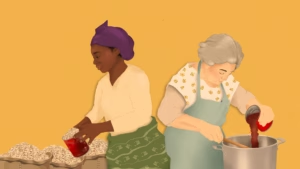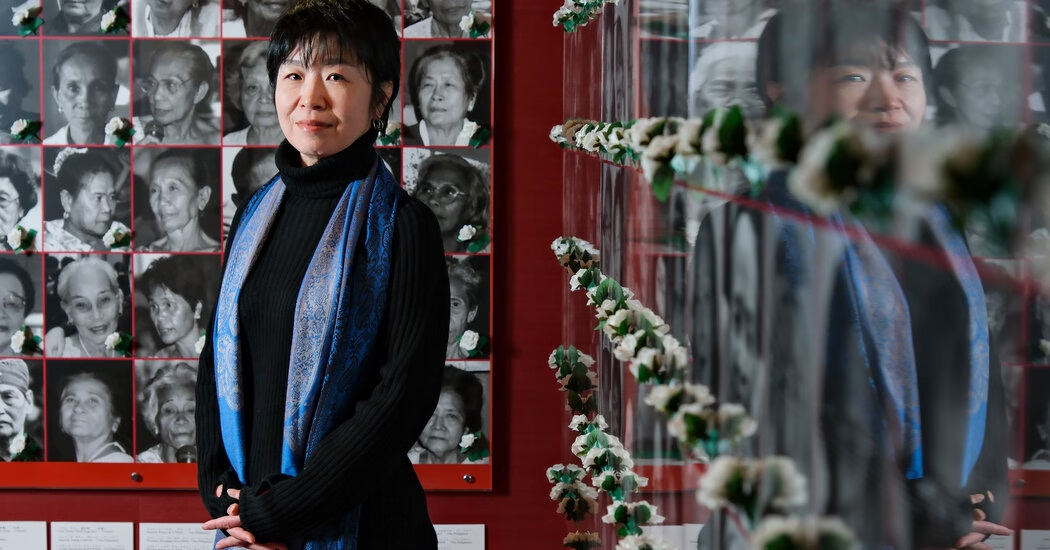This article is part of a special report by The New York Times highlighting women who are creating new paths and fighting for opportunities for women and others.
When Gil Won-ok, a Korean woman, recently passed away at the age of 96, the international community lost a vocal advocate in the effort to hold Japan accountable for its practice of sexual slavery during the early part of the 20th century.
Ms. Gil was one of around 240 so-called comfort women from South Korea who had spoken publicly about their abuse at the hands of the Japanese military from the 1930s through World War II, and her death left only a few survivors to continue the cause.
However, Mina Watanabe, a Japanese woman born years after the war and with no direct connection to the practice or its victims, has continued to push for fuller recognition and reparations from Japan. As director of the Women’s Active Museum on War and Peace (WAM) in Tokyo, she and the museum focus on sexual violence against women in war and conflict situations — with a special emphasis on her homeland’s history.
Ms. Watanabe said that her encounters with survivors of Japan’s military sexual slavery system in the 1990s “changed my life,” she recounted in an interview in Tokyo.
She co-founded the museum in 2005 with donations from people in Japan and abroad, and has been campaigning internationally for the rights of survivors ever since.
Activists for comfort women often face criticism or isolation from their fellow Japanese. The interview was edited and condensed.
Who are the women referred to as “comfort women”?
This term refers to the women who were enslaved in the Japanese military’s sexual slavery system from the 1930s to 1945 in the Asia-Pacific region. While “sex slaves” is a more accurate description of the various forms of sexual exploitation they suffered, we retain the term “comfort women” due to its historical significance, as it was the euphemism used by the Japanese military at the time.
The Japanese government admits that girls and women suffered, but denies evidence that they were taken against their will during wartime. They have said that with the agreement reached at the Japan-ROK Foreign Ministers’ Meeting in December 2015, the issue was “resolved finally and irreversibly.” What are you still seeking?
The issue is not how they were taken, but being held against their will and subjected to rape for months or years under military control. Without a clear explanation, the government still denies it was sexual slavery. What the survivors wanted was for the Japanese government to fully acknowledge what had happened and pass on their stories to future generations to prevent it from happening again. It’s not just about a bilateral agreement with South Korea. Although many survivors have died, we continue our efforts to have the government recognize the crimes committed by its military. I feel it is my responsibility as a woman in Japan.
Has any progress been made?
Regarding reparations, nothing has progressed. The government has claimed to have apologized, but it has never been clear what for. It is our sorrow and shame that the Japanese government does not accept the survivors’ testimonies as evidence even now.
However, the perception of “comfort women” has changed dramatically in the global community. International law now explicitly recognizes wartime rape and sexual slavery as crimes against humanity. People have listened to the survivors’ stories with compassion and respect them as human rights defenders.
You have said that Japan’s treatment of comfort women influences the treatment of women in today’s society in Japan. Could you give us some examples?
It is still common for victims of sexual crimes to face difficulties in bringing perpetrators to justice anywhere in the world, but in Japan, there seems to be some “tolerance” for sexual violence committed by military forces. There have been many rapes by U.S. troops in Okinawa, where many U.S. bases in Japan are concentrated, but these incidents often go unprosecuted. Even a well-known Japanese politician has suggested that U.S. military officers utilize the sex industry. The notion that sexual violence by soldiers is inevitable must be deeply ingrained in Japan.
(Asked to respond, the Pentagon issued a statement: The conduct of U.S. Forces Japan adheres to strict professionalism and zero tolerance for criminal behavior. U.S. personnel who engage in criminal acts are held accountable under both Japanese and U.S. law, as per the Status of Forces Agreement. Acts of sexual assault undermine the values of respect and dignity that are essential to military service. These incidents overshadow the friendship and professionalism that U.S. service members exhibit every day. They do not represent the positive contributions of the vast majority of U.S. service members who serve honorably in Japan.)
How did you become involved with the Women’s Active Museum on War and Peace (WAM)?
I became involved in the women’s movement in the mid-1990s and met the late Yayori Matsuiin Japan, a prominent journalist and activist. She proposed the Women’s International War Crimes Tribunal on Japan’s Military Sexual Slavery, to be held in Tokyo in 2000, aiming to bring those responsible to justice based on evidence and the law. I was involved in its preparation. After the tribunal issued its judgment in 2001, Yayori passed away in 2002. Her last wish was to establish a museum in Japan to preserve the testimonies and documents collected during the Women’s Tribunal. To show the full picture of the “comfort women” system within our limited space, we have since held over a dozen special exhibitions focusing on various countries and regions of the Asia-Pacific over these 20 years.
What work have you been doing to improve the treatment of women in Japanese society?
As part of our concerted efforts, WAM, along with activists and scholars from eight other countries, has submitted an application regarding “comfort women” to the UNESCO Memory of the World Register as a rare and important documentary heritage to be preserved. The Japanese government has tried to block this submission and has withheld its contribution to UNESCO once, but the process is set to resume this year.
There are people in Japan too, who support our efforts to heed the call of these courageous survivors for justice and to ensure it does not happen again. That gives me hope.
Source: https://www.nytimes.com/2025/03/06/world/asia/women-japan-comfort-women.html





